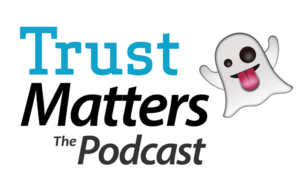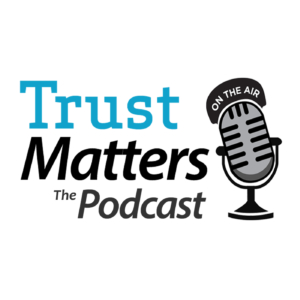Podcast Interview: The Importance of Trust in Remote Leadership
Learn how to connect with and read your team better, virtually. Understand how Intimacy and Self orientation are more important than ever.
Learn how to connect with and read your team better, virtually. Understand how Intimacy and Self orientation are more important than ever.
Podcast: Embed
Subscribe to TrustMatters, The Podcast RSS
Welcome to the newest episode of Trust Matters, The Podcast. Listeners submit their personal questions about professional relationships, trust, and business situations to our in-house expert Charles H. Green, CEO, Trusted Advisor Associates and co-author of The Trusted Advisor.
A technology project manager writes in and asks, “I’ve been responding to postings in my field, I’ve got a solid resume, and I’m getting interviews, but – I’m not getting call-backs. In my interviews, I make sure to highlight the project management fits in my resume with the specific requirements they cite. But something isn’t working. Any advice?”
Looking for more advice on how to improve your interview skills? Join our next webinar How to Influence a Skeptical Audience: 3 Simple Steps
Do you want to send your questions to Charlie & Trust Matters, The Podcast?
We’ll answer almost ANY question about confusing, complicated or awkward business situations with clients, management, and colleagues. Email us: [email protected]
Podcast: Embed
Subscribe to TrustMatters, The Podcast RSS
Welcome to the newest episode of Trust Matters, The Podcast. Listeners submit their personal questions about professional relationships, trust, and business situations to our in-house expert Charles H. Green, CEO, Trusted Advisor Associates and co-author of The Trusted Advisor.
Dr. Peter Johnson, Clinical Professor of Marketing at Fordham’s Gabelli School of Business in New York. Dr. Johnson writes in to suggest we talk about the role of trust in a critical business transition – from a salesperson to a sales manager.
Learn more about the basic tools of trust and professional relationships. Play the podcast episode above and register for our next webinar on February 25.

Podcast: Embed
Subscribe to TrustMatters, The Podcast RSS
Welcome to the newest episode of Trust Matters, The Podcast. Listeners submit their personal questions about professional relationships, trust, and business situations to our in-house expert Charles H. Green, CEO, Trusted Advisor Associates and co-author of The Trusted Advisor.
A customer service manager at a B2B SAS company is in a tricky situation: “I just started a role at a new company. The way they manage aspects of customer service feels a bit sleazy to me. It seems to be part of a larger culture. There is a lot I like about this company and my new job otherwise. How should I handle this situation?”
Do you want to send your questions to Charlie & Trust Matters, The Podcast?
We’ll answer almost ANY question about confusing, complicated or awkward business situations with clients, management, and colleagues.
Email: [email protected]
We post new episodes every other week.
Subscribe to get the latest episodes:
Podcast: Embed
Subscribe to TrustMatters, The Podcast RSS
This is the newest of Trust Matters, The Podcast. Listeners submit their personal questions about professional relationships, trust, and business situations to our in-house expert Charles H. Green, CEO, Trusted Advisor Associates.
An experienced B2B, technology Product Leader asks, “Should I break out and become a SME Consultant, starting my own practice or should I continue working at bigger companies? What do I need to know about starting my own consulting business?”
Do you want to send your questions to Charlie & Trust Matters, The Podcast?
We’ll answer almost ANY question about confusing, complicated or awkward business situations with clients, management, and colleagues.
Email: [email protected]
We’ll be posting new episodes every other week.
Subscribe to get the latest episodes
Podcast: Embed
Subscribe to TrustMatters, The Podcast RSS
This is the newest of Trust Matters, The Podcast. Listeners submit their personal questions about professional relationships, trust, and business situations to our in-house expert Charles H. Green, CEO, Trusted Advisor Associates.
The owner of a small tech consultancy talks about her recent experience being ghosted by a contractor she hired. She asks “What should I do about being ghosted? How can I prevent this from happening again in the future?”
Want to learn more about how to handle ghosting in business? Read recent blog by Charles H. Green.
Do you want to send your questions to Charlie & Trust Matters, The Podcast?
We’ll answer almost ANY question about confusing, complicated or awkward business situations with clients, management, and colleagues.
Email: [email protected]
We’ll be posting new episodes every other Tuesday.
Subscribe to get the latest episodes

Podcast: Embed
Subscribe to TrustMatters, The Podcast RSS
This is the newest of Trust Matters, The Podcast. Listeners submit their personal questions about professional relationships, trust, and business situations to our in-house expert Charles H. Green, CEO, Trusted Advisor Associates.
A manager at a communications firm writes in and asks “How to you manage qualified sales leads that seem very interested but then go silent? Do you keep reaching out? Do you try another approach?”
Do you want to send your questions to Charlie & Trust Matters, The Podcast?
We’ll answer almost ANY question about confusing, complicated or awkward business situations with clients, management, and colleagues.
Email: [email protected]
We’ll be posting new episodes every other Tuesday.
Subscribe to get the latest episodes

Podcast: Embed
Subscribe to TrustMatters, The Podcast RSS
This is the newest of Trust Matters, The Podcast. Listeners submit their personal questions about professional relationships, trust, and business situations to our in-house expert Charles H. Green, CEO, Trusted Advisor Associates.
A solo consultant asks , “How do I ask a long-standing client, whom I already bill a lot monthly, for a rate increase?”
Do you want to send your questions to Charlie & Trust Matters, The Podcast?
We’ll answer almost ANY question about confusing, complicated or awkward business situations with clients, management, and colleagues.
Email: [email protected]
We’ll be posting new episodes every other Tuesday.
Subscribe to get the latest episodes

This is the second in a series of five posts on short (seven words or less) powerful phrases. Each phrase distills the essence of a key part of approaching trust-based relationships in business.
Why focus on short phrases like this? Because the concise expression of several emotionally powerful concepts packs a punch. Such phrases feel profound. They catch the listener’s attention. They force the listener to reflect. They are short enough to remember every word, and therefore to resonate in the mind of the listener.
Today’s Phrase: (Four words)
“At the risk of…”
What then follows is a short list of your fears about what will happen if you say what you are about to say. (And usually your fears are shared by the others in the conversation).
These four little words pack an emotional punch well beyond their weight. They work because of the relationship between Transparency, Vulnerability, and Risk-taking, and because of the power of Ironic Over-statement.
Transparency. The opposite of transparency is opacity. When interactions are opaque, there is room for all parties to imagine all manner of bad motives, monsters lurking under the bed. When someone chooses to be transparent – to reveal their true motives, to shine a light on the ‘monsters’ – we relax. We feel more intimacy with that person, and our mistrust fades away. By speaking of the ‘elephant in the room,’ we deprive the elephant of its emotional power over us.
Vulnerability. By choosing to be the first to challenge the ‘rule’ about not speaking of the elephant, you are overtly taking a risk – the risk that every fear you listed may in fact be true.
Risk-taking. All trust starts with someone taking the risk. If you always wait for the other person to take the first risk, you are passively defaulting your power (the analogue in sales is “aggressively waiting for the phone to ring”). These four words not only announce your intent to take the first risk, but mitigate the risk you are taking (see the bullet points in ‘vulnerability’ comments above).
Ironic Over-statement. Note the adjectives and adverbs in the examples above: complete ignorance, way too deep, grossly misreading. We all know the lesson of Watergate: the cover-up is always worse than the crime.
By ironically over-stating our fears, we are immunizing ourselves against the Watergate error. No one can mistake your intent for a flimsy excuse, a lame apology, or an almost-but-not-quite admission. It evokes a response of, “All right, OK, we got it, let’s move along” – which is precisely what you want.
Next Blogpost: Short Phrase #3 of 5: “Help me Understand…”
Click Here To Read The Full Series:

This is the first in a series of five posts on short (seven words or less) powerful phrases. Each phrase distills the essence of a key part of approaching trust-based relationships in business.
Why focus on short phrases like this? Because the concise expression of several emotionally powerful concepts packs a punch. Such phrases feel profound. They catch the listener’s attention. They force the listener to reflect. They are short enough to remember every word, and thus to resonate in the mind of the listener.
Today’s Phrase: (Seven words)
“I could be wrong about this, but…”
What then follows is an observation, hypothesis, or point of view, that you wish to put forward to your client.
This little phraselet triggers four key concepts behind trust-based interactions: Low Self-orientation, Respect, Reciprocity, and Risk.
Low Self-orientation. By explicitly acknowledging up front your possible fallibility, you show that you are willing to subordinate your ego for the greater good of the team (paradoxically demonstrating that you are comfortable enough in your own skin to withstand being perceived as wrong).
Respect. By overtly confessing that you might not be right, you are deferring to the client as a possible arbiter of the real truth. It invites a correction if one exists. At the same time, if the client doesn’t have the right answer, it lets them off the hook, allowing them to save face – because at worst, they are your equal in ignorance.
Reciprocity. Reciprocity is a fundamental dynamic of human relationships, forming the template for such interactions as etiquette, influence, and trust. If you do X first, I will do the same in return. If you listen to me, I will listen to you; if you treat me well, I will treat you well; if you humble yourself to me, I will humble myself to you.
Risk. At nearly every point in nearly every relationship, each party fears taking a small risk to go deeper. Short term loss always overwhelms long-term gain in our emotional short-sightedness. But “I could be wrong, but…” says to the other party, “It’s OK – I’ll take the first risk. I’ll test the water, I’ll risk the humiliation – I’ll put myself forward to lessen the risk to you.” And, as per the reciprocity point above, this willingness to take the first risk results – paradoxically – in greater willingness of the other person to join you.
Next Blogpost: Short Phrase #2 of 5: “At the risk of…”
Click Here To Read The Full Series: